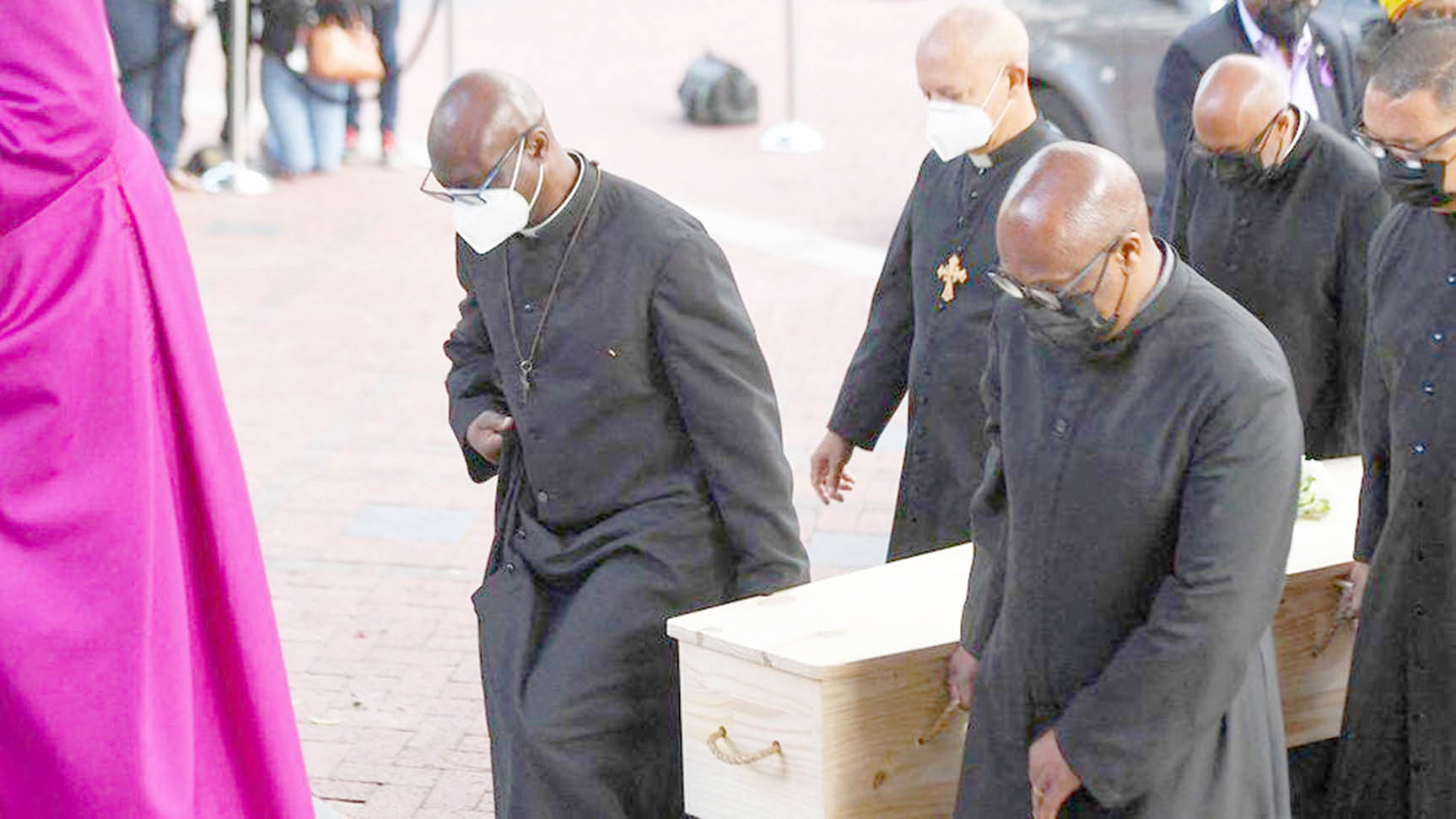The South African flag was flown at half-mast as its grieving citizens gathered for the state funeral of a hero and anti-apartheid movement icon, Archbishop (Emeritus) Desmond Tutu.
Tutu, also called the “moral compass” for the South African people, lived for 90 years and has left a legacy that transcends borders that will echo for many generations to come.
Today, Tutu who worked tirelessly, though non-violently, for the downfall of the brutal South African apartheid regime, will be laid to rest at the St George’s Cathedral in Cape Town after a two-day lying-in-state that allowed mourners file past his body to say their final goodbye.
Last Thursday, priests burnt incense as Tutu’s simple wooden coffin was carried into the cathedral.
Tutu’s wish was that there be “no ostentatiousness or lavish spending” on his funeral and he even requested that “the coffin be the cheapest available”, his foundation said.
Born on October 7, 1931, at Klerksdorp in the former Transvaal Province, Tutu aspired to be a doctor. While he was accepted to do a degree in medicine, he was not able to obtain a bursary to pursue the ambition, so he settled for teaching; a career his father had followed.
In 1951, he enrolled at the Bantu Normal College outside Pretoria where he studied and obtained a teacher’s diploma.
He taught at his old school, Madipane High in Krugersdorp, and in 1955 he obtained a Bachelor of Arts (BA) from the University of SA (Unisa), according to sahistory.org.za.
On July 2, 1955, Tutu married Nomalizo Leah Shenxane, after which he began teaching at Munsieville High School, where his father was headmaster.
Tutu and Leah gave birth to four children: Trevor Thamsanqa, Theresa Thandeka, Naomi Nontombi and Mpho Andrea.
In 1955, Tutu enrolled at St Peter’s Theological College in Rosettenville, Johannesburg.
Though he was baptised as a Methodist, his family had joined the Anglican Church in 1943. Tutu was ordained a deacon in December, 1960, at St Mary’s Cathedral, Johannesburg, and took up his first curacy at St Alban’s Church in Benoni location.
Tutu became the first black archbishop of the Anglican Church.
Though short in stature, Tutu was a giant in South African politics, notable for his drive, infectious laughter and witty critique of apartheid’s absurdities.
He always told his followers: “Be nice to whites; they need you to rediscover their humanity.”
In 1984, he won the Nobel Peace Prize for his non-violent opposition to apartheid. A decade later, he witnessed the end of that regime and he chaired the Truth and Reconciliation Commission set up to unearth atrocities committed during the segregation period.
Tutu led numerous marches and campaigns to end apartheid from St George’s steps, and as a result it became known as the “People’s Cathedral” and a powerful symbol of democracy, according to the local government.
Tutu was a longtime friend of Nelson Mandela and lived for a time on the same street in the South African township of Soweto, Vilakazi Street, the only one in the world to host two Nobel Peace Prize winners.
Tutu used his senior position in the Anglican Church and the acclaim the Nobel Peace Prize brought to spread his anti-apartheid message internationally and elevate the experiences and lives of Black South Africans while leaders such as Mandela were in prison.
Tutu brought Mandela onto a balcony at Cape Town City Hall after his release from jail after 27 years where he gave his first public speech.
Tutu compared voting in the first democratic elections in the country that brought Mandela to power in 1994 to “falling in love”. He was present when Mandela was sworn in as the country’s first black president.
Befitting tributes by world leaders
President Joe Biden has described Tutu as the true servant of the people and God, and a former US President, Barack Obama, said he had lost a mentor and friend. Obama called Tutu a universal spirit who was grounded in the struggle for the liberation of his country.
Queen Elizabeth II said his death would be felt by many in Great Britain who held him in high affection and esteem.
South Africa President, Cyril Ramaphosa, said his demise was “another chapter of bereavement in our nation’s farewell to a generation of outstanding South Africans who have bequeathed us a liberated South Africa.”
President Muhammadu Buhari said the life of Archbishop Tutu was a message of love and forgiveness and his legacies “will resonate through generations, bringing more light and clarity to religious diversity, democracy and good governance.”
According to a statement: “The president prays for the repose of the soul of Archbishop Tutu whose life and times sent an unforgettable message on love and forgiveness.”
French President, Emmanuel Macron, said in a tweet that Tutu had “dedicated his life to human rights and equality between peoples. His struggle for the end of apartheid and for reconciliation in South Africa will remain in our memory.”
The Vatican said in a statement that Pope Francis was saddened and offered “heartfelt condolences to his family and loved ones. Mindful of his service to the gospel through the promotion of racial equality and reconciliation in his native South Africa, his holiness commends his soul to the loving mercy of Almighty God.”
Wasel Abu Yousef, a member of the Executive Committee of the Palestine Liberation Organisation (PLO), remembered Tutu as “one of the biggest supporters of the Palestinian cause.
“He always advocated the rights of the Palestinians to gain their freedom and rejected Israeli occupation and apartheid,” Abu Yousef said.
Recall that in one of his bold speeches to power, Tutu ruffled Israeli feathers by comparing the treatment of Palestinians with apartheid South Africa. This made him lose favour among the Israelites. Even in 2021, Israel continued to block Tutu’s visit to Gaza.

 Join Daily Trust WhatsApp Community For Quick Access To News and Happenings Around You.
Join Daily Trust WhatsApp Community For Quick Access To News and Happenings Around You.


